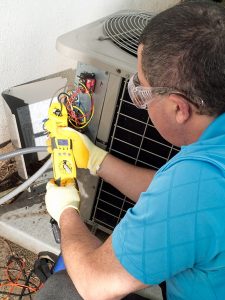Refrigerant is an essential part of any air conditioning system. It’s also an often misunderstood part of how an air conditioner works, and these misconceptions can often lead to bigger problems for an air conditioner that doesn’t end up getting the repair work it needs.
In this post, we’re going to examine air conditioning refrigerant and why it often plays a key role in AC repairs. The more you know about refrigerant, the better you’ll be able to recognize problems in your home’s air conditioning system.
Refrigerant: It’s Not a Fuel Source
This is the main misunderstanding that many people have about refrigerant. They assume that an air conditioner uses the refrigerant to help power it. Therefore, like any fuel source, refrigerant will eventually run out and need replacement.
This isn’t true, because refrigerant is not a fuel source, or any type of energy source, for an air conditioner. An AC has one energy source: electricity. This is what powers its components to run.
Refrigerant does a different job: it’s the heat exchange medium that allows the air conditioner to move heat from inside the house and exhaust it outside. The refrigerant switches between liquid and gaseous states as it does this, but it never dissipates. Unless there are refrigerant leaks, the amount of refrigerant in an AC system won’t change during its service life.
Loss of Refrigerant: A Major AC Problem
One of the most common repairs an air conditioner may need is to seal refrigerant leaks and recharge the refrigerant level. Air conditioners are designed to run on a specific amount of refrigerant (known as the system’s charge). If that charge drops, it jeopardizes the entire air conditioner.
Not only will the AC begin to lose cooling capacity and create a more humid indoors, the low refrigerant charge will eventually cause the compressor to burn out.
A dead compressor often means the whole AC must be replaced, so this is a problem you want caught early and fixed. Any signs of the air conditioner not operating properly might be due to refrigerant leaks, so never hesitate to call for repairs!
Excess Refrigerant: Just as Bad
Here’s another way refrigerant can create a repair need: too much in the AC. An overcharged air conditioner alters the pressure inside the system and often causes slugging, liquid refrigerant flowing the wrong direction into the compressor, which can easily cause compressor failure.
But how does too much refrigerant get into an AC? It’s often due to amateur repair work. Nonprofessionals often put too much refrigerant into an AC during either a repair or an installation. And this leads us directly to the next point…
Only Certified Professionals Can Handle Refrigerant
HVAC technicians must have EPA certification to handle refrigerant: charging a newly installed unit, recharging a unit, removing excess refrigerant, and disposing of it. It’s not only an issue of training, but also environmental protection.
This is one of the reasons you only want to rely on professionals when you have any type of AC repair in Conyers, GA. Many times, working with refrigerant is a part of an AC repair, and you only want certified pros to be on the job.
Experience the Premier Difference! Premier Heating & Air has been family-owned and operated since 2001.


